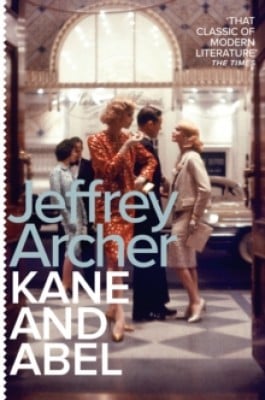Even though I have read Honour Amongst Thieves and Only Time Will Tell I still have a hard time believing that Jeffrey Archer is an author. Not only that but an author of books that are not even really about politics. Whereas Honour Amongst Thieves heavily featured American politics Kane and Abel, following the lives of two men born to very different fortunes shortly after the turn of the 20th century only glances into politics as the time span necessitates.
Gripping right from the start the book, originally published now over 35 years ago, surprisingly hasn't dated. Maybe as it's your typical family saga where a great number of years are covered, modernity matters less. I liked the way Archer covered the passing of years, references to Ford and other various 'up and coming' companies being name dropped into the text. Reading about Poland during the First World War and Abel's travels in stark contrast to Kane's childhood was a brilliant read.
I enjoyed Kane and Abel's early life so much I didn't realise that you actually need to get a good way through the book before the billed 'all consuming hatred' of each other begins. When it did, I was a little disappointed. Of all the things to happen to Abel, the one he takes issue with is Kane? And speaking about Kane, why was the hatred returned? For me it didn't make sense and weakened the otherwise excellent story telling. I also guessed the twist which just made the central concept of two men at war and hell bent on revenge even more confusing.
I really liked the fact the vendetta wasn't sparked by a woman which would have been so easy to do. Whilst the wooing of Kate by Kane was very unrealistic and the demotion of producing children and occasionally expressing Kane worked too hard was typical, I was pleased that Florentyna escaped this type casting and became a shrewd business woman. Although it did veer into slight Romeo and Juliet territory (without the mutual suicide!)
I found the end of the book sad more than anything. It did seem to lose pace slightly with big chunks of time passing in a sentence here and there. I can't decide whether Archer simply ran out of steam or whether it was a deliberate move to represent how bland Kane and Abel's lives were without certain key members. I was surprised by how willingly Kane accepted the bank's decision, the most unjust in the book, but by this point I guess he just didn't care. The naming of the grandchild, and its delayed reveal was also slightly cringe worthy.
There is a sequel, The Prodigal Daughter but as with Only Time Will Tell (where my prediction was correct by the way, Archer has just published book number 7 in the series) I'm going to avoid as series' are not really my thing. Another good outing from Archer though. I wonder how may I will have to read before I accept him as an author?
Gripping right from the start the book, originally published now over 35 years ago, surprisingly hasn't dated. Maybe as it's your typical family saga where a great number of years are covered, modernity matters less. I liked the way Archer covered the passing of years, references to Ford and other various 'up and coming' companies being name dropped into the text. Reading about Poland during the First World War and Abel's travels in stark contrast to Kane's childhood was a brilliant read.
I enjoyed Kane and Abel's early life so much I didn't realise that you actually need to get a good way through the book before the billed 'all consuming hatred' of each other begins. When it did, I was a little disappointed. Of all the things to happen to Abel, the one he takes issue with is Kane? And speaking about Kane, why was the hatred returned? For me it didn't make sense and weakened the otherwise excellent story telling. I also guessed the twist which just made the central concept of two men at war and hell bent on revenge even more confusing.
I really liked the fact the vendetta wasn't sparked by a woman which would have been so easy to do. Whilst the wooing of Kate by Kane was very unrealistic and the demotion of producing children and occasionally expressing Kane worked too hard was typical, I was pleased that Florentyna escaped this type casting and became a shrewd business woman. Although it did veer into slight Romeo and Juliet territory (without the mutual suicide!)
I found the end of the book sad more than anything. It did seem to lose pace slightly with big chunks of time passing in a sentence here and there. I can't decide whether Archer simply ran out of steam or whether it was a deliberate move to represent how bland Kane and Abel's lives were without certain key members. I was surprised by how willingly Kane accepted the bank's decision, the most unjust in the book, but by this point I guess he just didn't care. The naming of the grandchild, and its delayed reveal was also slightly cringe worthy.
There is a sequel, The Prodigal Daughter but as with Only Time Will Tell (where my prediction was correct by the way, Archer has just published book number 7 in the series) I'm going to avoid as series' are not really my thing. Another good outing from Archer though. I wonder how may I will have to read before I accept him as an author?

Comments
Post a Comment